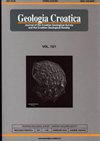Comparison of urban and rural soils based on speciation of heavy metals by BCR sequential extraction procedure: A case study in the historical and industrial city of Sisak, Croatia
IF 1.1
4区 地球科学
Q3 GEOLOGY
引用次数: 0
Abstract
Within the framework of the pan-European project “URban GEochemistry (URGE) in Europe – Soil, children, health”, pedological and geochemical investigations of the soils of the city of Sisak and its adjacent surroundings were carried out, and three urban and two rural soil profiles were examined. The mineralogical composition and concentration of selected potentially toxic elements (PTEs) Cr, Cu, Ni, Pb and Zn in the soil were determined. The Community Reference Bureau of Reference (BCR) sequential extraction procedure (SEP) of these PTEs was undertaken and the potential risk to human health and the environment was assessed. The concentrations of Cr and Ni are generally similar in urban and rural soil profiles, while the concentrations of Cu, Pb and Zn in soil horizons/layers are higher in urban profiles. The extracted fractions of PTEs gave the following general distribution: in urban soil profiles residual (RES) > reducible (ORG) or oxidisable (FEMN) > exchangeable (CARB), except for Cu where ORG > RES > FEMN > CARB, while in rural soil profiles RES > FEMN or ORG > CARB, except for Pb where FEMN > RES or ORG > CARB. The differences between soils in urban and rural profiles depend mainly on the historical land use, i.e. on the duration and intensity of anthropogenic influences on the soil and, to a lesser extent, on the geogenic origin of the parent material and the pedogenic processes. The studied elements in the urban soil profiles are predominantly of anthropogenic origin, indicating a possible influence of the ancient settlements of Segestica and Siscia and of heavy industry in the 20th century. The anthropogenic influences on the rural profiles are low and geogenic influences dominate. Risks to the environment were assessed in the soil profiles based on PTE concentrations in the CARB fraction and the sum of the CARB, ORG and FEMN fractions from BCR SEP. All calculated risks to human health and the environment were rated as no-risk, very low risk and low risk.基于BCR顺序提取程序的重金属形态的城市和农村土壤的比较:以克罗地亚Sisak的历史和工业城市为例
在泛欧项目“欧洲城市地球化学——土壤、儿童、健康”的框架内,对西萨克市及其邻近地区的土壤进行了土壤学和地球化学调查,并检查了三个城市和两个农村土壤剖面。测定了土壤中潜在有毒元素(pte) Cr、Cu、Ni、Pb和Zn的矿物学组成和浓度。对这些pte进行了社区参考资料局(BCR)顺序提取程序(SEP),并评估了其对人类健康和环境的潜在风险。Cr和Ni在城市和农村土壤剖面中的含量基本相似,而Cu、Pb和Zn在城市剖面中的含量较高。pte的提取组分大致分布如下:在城市土壤剖面中,除Cu为ORG > RES > FEMN > CARB外,剩余组分(RES) >可还原组分(ORG)或可氧化组分(FEMN) >交换组分(CARB);在农村土壤剖面中,除Pb为FEMN > RES或ORG > CARB外,其余组分为RES > FEMN或ORG > CARB。城市和农村土壤概况之间的差异主要取决于历史上的土地利用,即取决于人为对土壤影响的持续时间和强度,并在较小程度上取决于母质的地质起源和成土过程。城市土壤剖面中所研究的元素主要是人为因素,表明可能受到20世纪塞格斯提卡和茜茜卡古聚落和重工业的影响。对农村剖面的人为影响较小,地质影响占主导地位。根据CARB组分中的PTE浓度和BCR SEP中CARB、ORG和FEMN组分的总和对土壤剖面的环境风险进行了评估。所有计算出的对人类健康和环境的风险均被评为无风险、极低风险和低风险。
本文章由计算机程序翻译,如有差异,请以英文原文为准。
求助全文
约1分钟内获得全文
求助全文
来源期刊

Geologia Croatica
GEOSCIENCES, MULTIDISCIPLINARY-
CiteScore
2.90
自引率
23.10%
发文量
35
审稿时长
>12 weeks
期刊介绍:
Geologia Croatica welcomes original scientific papers dealing with diverse aspects of geology and geological engineering, the history of the Earth, and the physical changes that the Earth has undergone or it is undergoing. The Journal covers a wide spectrum of geology disciplines (palaeontology, stratigraphy, mineralogy, sedimentology, petrology, geochemistry, structural geology, karstology, hydrogeology and engineering geology) including pedogenesis, petroleum geology and environmental geology.
Papers especially concerning the Pannonian Basin, Dinarides, the Adriatic/Mediterranean region, as well as notes and reviews interesting to a wider audience (e.g. review papers, book reviews, and notes) are welcome.
 求助内容:
求助内容: 应助结果提醒方式:
应助结果提醒方式:


